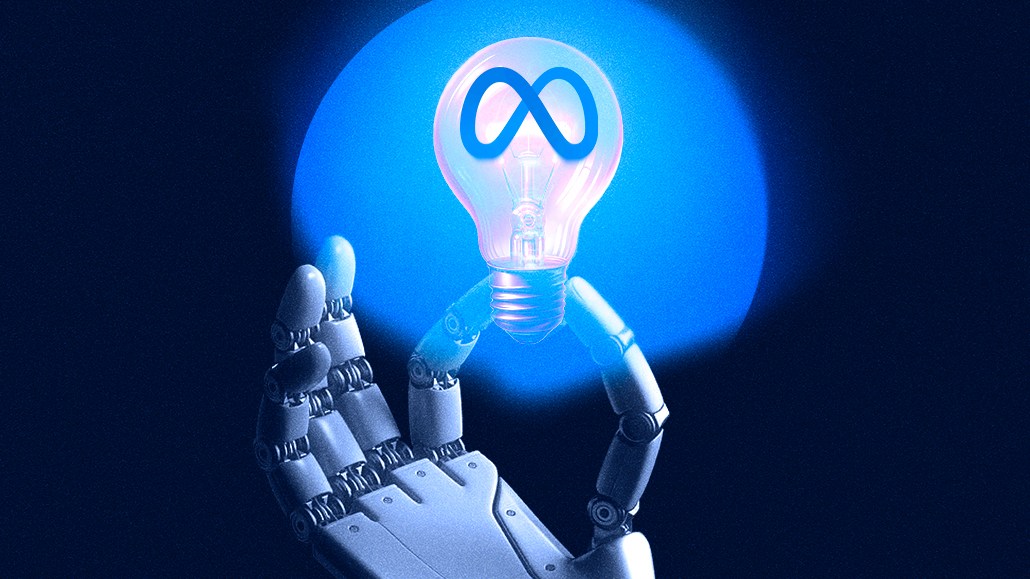Secure your place at the Digiday Media Buying Summit in Nashville, March 2-4
Meta’s Superintelligence Labs is already becoming part of the pitch to marketers

Mark Zuckerberg’s latest big swing — Meta’s SuperIntelligence Lab — is trying to redefine what AI means on his terms.
That redefinition, like most things at Meta, will inevitably run through the company’s ads business. Especially as the company continues to auotmate more of it, with plans to eventually automate the entire system, according to The Wall Street Journal. That means the same tools Meta claims will usher in a new era of artificial intelligence will, in the near term, be tasked with more familiar work tweaking creative, bidding strategies and targeting levers to keep the ads machine growing.
But despite it still being very early days for Meta’s Superinteligence Lab, three of the ad execs Digiday caught up with confirmed it’s already entering the conversation in some way or another. The level of details still vary from rep to rep, but this is the team charged with getting buy-in from advertisers bringing Zuckerberg’s latest vision to life — Superintelligence, or AI, that surpasses human cognitive ability.
“One of the products they’re currently working on allows Meta’s AI technology to sift through all the videos and Reels across Meta’s platforms and make them all contextually indexable,” said Shamsul Chowdhury, global evp paid social at Jellyfish.
Chris Matheson, media director at Markacy said that currently, his Meta reps are mostly hyping it up — but they haven’t shared much yet in the way of details.
“Names like Alexandr Wang [Meta chief AI officer] and Nat Friedman [Meta co-director of Superintelligence Labs, head of AI products and applied research] are dropped, but product timelines remain vague,” he said. “Reps are leaning on past AI wins (such as Meta AI’s 1 billion users, Ray-Ban glasses and so on) to reassure, while pitching it as a long-term differentiator.”
Jack Johnston, senior social innovation director at Tinuiti had a similar take.
“It’s popped up in conversation when someone at Meta is very passionate about it, and they’re talking about how cool or interesting something is,” he said. “But it’s more of a social conversation rather than what’s coming down the line for advertisers.”
Which is to say it’s a world away from the full-throttle approach that engulfed Meta’s pivot into the metaverse. That rollout (in October 2021) was anything but measured — complete with rebranding the entire company, splashy demos and Zuckerberg betting the future of the business on avatars and virtual real estate.
But now betting its future on AI, Meta is building the foundations behind the scenes: tweaking its org structure, bringing in experts, figuring out how to put its stamp as a leader in the space — getting their ducks in a row before publicly committing to a seemingly unchangeable roadmap. As Zuckerberg put it on the company’s recent earnings call, when it comes to Superintelligence: “we think that this is going to really shape all of our systems sooner rather than later, not necessarily on the trajectory of a quarter or two, but on the trajectory of a few years.”
“You don’t become these billion dollar companies without thinking about what lies ahead,” said Chowdhury.
A look at the Superintelligence Labs blueprint
To grasp why there’s so much excitement around this group, it helps to understand how it was built in the first place.
Superintelligence Labs was officially launched last month (July 1) one day after CEO Mark Zuckerberg told employees that Meta was creating the new unit.
The new unit consolidates Meta’s core AI teams — FAIR, foundational models and product — under one roof. As of now, LinkedIn shows 105 employees at SuperIntelligence Labs, though it’s believed the team is actually far bigger, with The Information reporting Superintelligence Labs currently has about 3,400 staff.
But the groundwork was laid well before the formal rollout this summer. Since the start of the year, Meta has been hiring top AI talent, with Zuckerberg himself leading the charge behind the scenes.
The most notable move so far is the $14.3 billion “acqui-hire” deal with ScaleAI, which saw Meta take a 49% stake in the company and bring on CEO Alexandr Wang as chief AI officer to lead its SuperIntelligence efforts, along with key members of his team.
The move itself received some backlash given it followed Meta’s antitrust case, in which the U.S. FTC accused the company of illegally monopolizing the social networking market by acquiring emerging rivals (at the time), Instagram and WhatsApp. But by entering into an acqui-hire, Meta has seemingly slipped under the radar of another questionable acquisition because this time it only owns a minority stake.
Meta declined to respond to Digiday’s request for comment.
Editor’s note: This story has been updated to correct an earlier error. It originally stated that MArk Zuckerberg plans to automate all advertising on Meta by the end of 2026. In fact, he has reportedly expressed that intention.
More in Marketing

Future of Marketing Briefing: AI’s branding problem is why marketers keep it off the label
The reputational downside is clearer than the branding upside, which makes discretion the safer strategy.

While holdcos build ‘death stars of content,’ indie creative agencies take alternative routes
Indie agencies and the holding company sector were once bound together. The Super Bowl and WPP’s latest remodeling plans show they’re heading in different directions.

How Boll & Branch leverages AI for operational and creative tasks
Boll & Branch first and foremost uses AI to manage workflows across teams.








